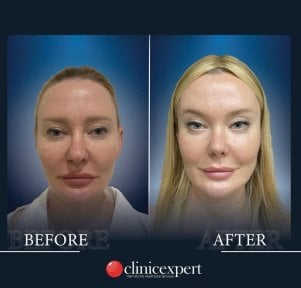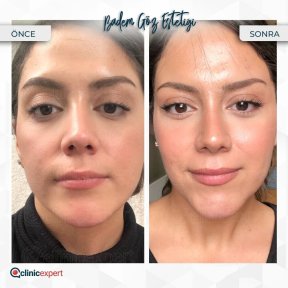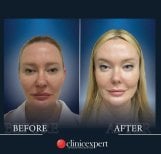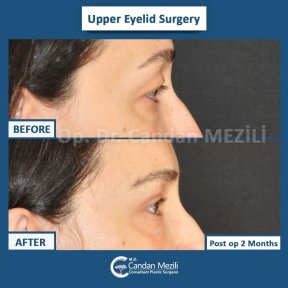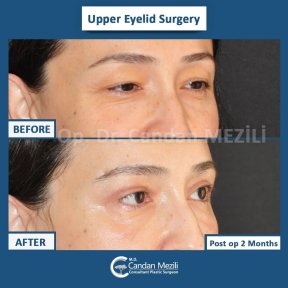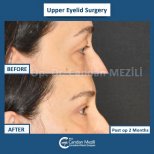Este pacote com tudo incluído apresenta uma técnica de incisão discreta na prega da pálpebra para um lifting sem cicatrizes. O Dr. Murat Turker realiza o procedimento de 45 a 60 minutos no premiado CE International Hospital. A clínica, certificada pela TÜV NORD CERT ISO 9001, utiliza salas de cirurgia com fluxo laminar para garantir a segurança cirúrgica. O pacote custa cerca de 3.610 $, cobrindo a cirurgia sob anestesia local, 4 noites de estadia em hotel, traslados VIP em Mercedes e suporte de tradução e enfermagem 24 horas por dia, 7 dias por semana.
Como funciona
Qual é o Custo de Lifting de Olhar de Raposa em Turquia? Descubra Agora
O custo de um Fox Eye Lift na Turquia normalmente varia de $3,600 a $4,100. Os preços variam dependendo da clínica, da experiência do cirurgião e se o lifting é feito cirurgicamente ou com fios. Nos Estados Unidos, o custo médio é de $9,800 (de acordo com a ASPS). Isso significa que os procedimentos de Fox Eye Lift na Turquia são cerca de 60% mais baratos do que nos EUA.
A maioria das clínicas turcas inclui a consulta inicial, exames de sangue pré-operatórios, medicamentos pós-operatórios, visitas de acompanhamento e suporte ao paciente 24 horas por dia, 7 dias por semana. Planos de tratamento personalizados e equipe que fala inglês são padrão. Nos EUA, o preço listado geralmente cobre apenas a taxa do cirurgião, sendo a anestesia, os medicamentos e o acompanhamento cobrados separadamente. Sempre confirme exatamente o que está incluído com cada clínica.
Principais benefícios
- Obtenha um lifting de olhos de raposa na Turquia com 60-80% de desconto em relação aos EUA e ao Reino Unido.
- Principais opções: Lifting com Fios PDO, Lifting Temporal e Canthoplastia.
- Revisão fotográfica gratuita por um médico para encontrar a melhor clínica e técnica para suas necessidades.
- Garantia de proteção total de dados e confidencialidade.
- Ofertas exclusivas de clínicas turcas de confiança de $3,639.
| Turquia | EUA | México | |
| Lifting de Olhar de Raposa | de $3,639 | de $7,500 | de $3,000 |
Revisado por
Fahad MawloodNão perca ofertas exclusivas de Lifting de Olhar de Raposa em Turquia para fevereiro 2026
Este pacote com tudo incluído, com um preço de cerca de 4.100 $, oferece um valor transparente para um Fox Eye Lift na Turquia. O cirurgião plástico certificado Dr. Candan Mezili, que completou uma rigorosa formação de especialidade de 6 anos na Universidade de Ege, realiza o procedimento na Clínica Privada do Dr. Candan Mezili. A taxa cobre a cirurgia, um internamento hospitalar de 1 dia, um hotel de 4 estrelas e transferes VIP de aeroporto para uma recuperação tranquila.
Descubra as Melhores Clínicas de Lifting de Olhar de Raposa em Turquia: 29 opções Verificadas e Preços
Lokman Hekim Istanbul Hospital
Murat Yaman
Medipol Acibadem District Hospital
Burak Ergun Tatar
Istanbul Aesthetic Plastic Surgery Center
Gürhan Özcan
Visão geral de Lifting de Olhar de Raposa em Turquia
- Blefaroplastia (Correção das pálpebras) - de $1,955Durante uma operação, o excesso de pele ou gordura dos olhos é removido para proporcionar uma aparência mais jovem e alerta.
- Cirurgia da Pálpebra Superior - de $2,133O procedimento eleva as pálpebras caídas, melhorando a visão e a estética. Envolve a remoção de pele em excesso, tecido adiposo e músculo.
- Blefaroplastia da Pálpebra Inferior - de $2,500Esta operação corrige a flacidez ou o excesso de pele sob o olho, removendo ou reposicionando gordura, melhorando a aparência.
- Cirurgia das Pálpebras Superiores e Inferiores - de $1,800Esta terapia repara a pele flácida ao redor dos olhos, renova a aparência e pode melhorar a visão ao remover o excesso de tecido.
- Operação de Pálpebra Dupla - de $800Esta cirurgia melhora a aparência dos olhos ao formar uma prega, revitalizando o olhar e melhorando a visão.
- Cirurgia de ptose palpebral - de $1,008Este procedimento corrige pálpebras caídas, melhorando a aparência e a visão, ao remover o excesso de pele e gordura.
- Cirurgia de pálpebra superior envelhecida - de $1,008Este procedimento corrige as pálpebras caídas para melhorar a aparência, envolvendo um cirurgião habilidoso que remove o excesso de pele.
- Cirurgia de ptose palpebral - de $1,800O procedimento corrige as pálpebras caídas, resultando em uma melhoria na visão e na aparência com um método cirúrgico seguro e rápido.
- Lifting de Olhar de Raposa - de $3,639A cirurgia de levantamento de olhos tipo raposa é um procedimento cosmético que eleva sutilmente os cantos externos dos olhos, criando uma aparência em forma de amêndoa, com tempo de recuperação mínimo necessário.
- Cirurgia do Olho de Gato (Cantopexia) - de $2,200Remodelação dos cantos externos dos olhos para obter uma aparência semelhante a amêndoas, melhorando a simetria ocular e o apelo estético, com tempo de recuperação mínimo.
- Cirurgia de Olhos em Amêndoa Masculina - de $2,100Este procedimento cosmético remodela os olhos para alcançar uma aparência mais alongada e semelhante a uma amêndoa, ajustando o posicionamento das pálpebras, realçando a harmonia e a simetria facial.
- Depósito Bookimed: $200 ou €200.
- Depósito da clínica: Pague uma porcentagem antecipadamente.
Obtenha uma Avaliação Médica para Lifting de Olhar de Raposa em Turquia: Consulte com 36 médicos Experientes Agora
Ver todos os médicosMurat Yaman
O Dr. Yaman realiza 500 a 600 procedimentos anualmente, focando em resultados de aparência natural em cirurgia estética e reconstrutiva no Hospital Lokman Hekim Istanbul.
- Formado em microcirurgia pela Universidade Hacettepe
- Especialista em lifting facial, cirurgias de nariz e orelha
- Membro da Sociedade Turca de Cirurgia Reconstrutiva, Estética e Plástica
- Dedicado à alta satisfação do paciente em procedimentos cosméticos
Muhammet Mustafa Aydinol
O Dr. Muhammet Mustafa Aydinol é membro da Sociedade Internacional de Cirurgia Plástica Estética (International Society of Aesthetic Plastic Surgery), especializando-se em procedimentos estéticos como o Fox Eye Lift.
- Certificado pelo conselho em Cirurgia Plástica, Reconstrutiva e Estética
- Publicou vários trabalhos de pesquisa sobre técnicas estéticas e reconstrutivas
- Membro da Sociedade Turca de Cirurgiões Estéticos
- Formado na Clínica de Cirurgia Plástica da Universidade Dicle
Aysel Pasazade
Dr. Aysel Pasazade is a plastic, reconstructive, and aesthetic surgeon. She graduated from Istanbul University Cerrahpaşa Faculty of Medicine. She completed her specialization at Bursa Uludağ University Faculty of Medicine. She holds the European Board of Plastic, Reconstructive and Aesthetic Surgery (EBOPRAS) certification.
She has worked in university hospitals and private clinics. She attends international congresses, live surgery courses, and advanced training. This keeps her practice current. She provides careful, personalized care with a focus on patient safety, function, and natural-looking results.
yunus Cinar
O Dr. Yunus Cinar fez a sua formação na Clínica Villa Bella, na Itália, sob a orientação do Prof. Giovanni Botti, especializando-se em estética facial e rinoplastia.
- Concluiu a residência em Cirurgia Plástica, Reconstrutiva e Estética
- Participou em inúmeros congressos científicos sobre estética facial
- Trabalha no Hospital Quartz, com foco em cirurgia estética
Histórias em vídeo de pacientes da Bookimed
Avaliações sobre Bookimed: descubra percepções de pacientes
Todas as avaliaçõesLifting de Olhar de Raposa: Fotos antes & depois
Ver todos Antes&DepoisCompartilhar este conteúdo
FAQ sobre Lifting de Olhar de Raposa em Turquia
Como posso verificar as credenciais e as taxas de sucesso dos cirurgiões que realizam Lift de Olhos Fox na Turquia?
Solicite informações sobre a formação do cirurgião, certificações e número de procedimentos realizados. Cirurgiões renomados costumam fornecer dados sobre taxas de sucesso e fotos de antes e depois de pacientes anteriores.
O que devo fazer se tiver complicações após voltar para casa da Turquia?
Se surgirem complicações, entre em contato imediatamente com o seu cirurgião para obter aconselhamento. Muitas clínicas oferecem consultas remotas para lidar com questões pós-operatórias; no entanto, procure atendimento médico local se necessário.
Como posso garantir que a clínica segue os padrões internacionais de saúde e segurança?
Verifique se a clínica é acreditada por organizações internacionais como a JCI ou segue as diretrizes estabelecidas pela ISAPS. A acreditação garante a adesão a protocolos rigorosos de saúde e segurança.
Quais são as alternativas não cirúrgicas à Blefaroplastia de Olhos de Raposa, e estão disponíveis na Turquia?
As alternativas não cirúrgicas incluem lifting com fios, Botox e preenchimentos, que estão disponíveis em muitas clínicas turcas. Essas opções oferecem resultados temporários com menos tempo de recuperação em comparação com os procedimentos cirúrgicos.
Posso confiar nas avaliações e depoimentos online sobre clínicas que oferecem Fox Eye Lift na Turquia?
Embora as avaliações online possam fornecer insights, é importante verificá-las por meio de fontes independentes ou fóruns de pacientes. Entrar em contato diretamente com pacientes anteriores pode oferecer um feedback mais confiável sobre suas experiências.
Como será gerenciado o acompanhamento após meu retorno para casa depois da cirurgia?
O acompanhamento muitas vezes é realizado por meio de consultas virtuais via chamadas de vídeo. As clínicas fornecem instruções detalhadas pós-operatórias e estão disponíveis para qualquer dúvida ou preocupação assim que você retornar para casa.
O que devo considerar ao planejar arranjos de viagem para cirurgia na Turquia?
Planeje uma estadia de pelo menos uma semana para acomodar as consultas pré-cirúrgicas e a recuperação inicial. Considere reservar acomodações próximas à clínica e garanta que você tenha transporte organizado para as visitas de acompanhamento.
Existem barreiras linguísticas que podem afetar minha compreensão do procedimento ou dos cuidados pós-operatórios?
Muitas clínicas turcas oferecem coordenadores e tradutores que falam inglês para auxiliar os pacientes internacionais. É importante confirmar os serviços de suporte em idiomas antes da sua visita para garantir uma comunicação clara.
Como é o processo de recuperação após um Lifting Fox Eyes e quanto tempo leva?
A recuperação de um Fox Eye Lift normalmente leva de 1 a 2 semanas, com a maioria dos pacientes retomando as atividades normais nesse período. Espere algum inchaço e hematomas inicialmente, que geralmente diminuem em 7-10 dias.
A qualidade do atendimento nas clínicas turcas é comparável à do meu país de origem?
Muitas clínicas turcas são acreditadas por organizações internacionais como a JCI, garantindo que elas atendam aos padrões globais de saúde. As clínicas costumam empregar tecnologia de ponta e pessoal altamente treinado, tornando a qualidade de seus cuidados comparável à dos países ocidentais.
Como posso saber se os cirurgiões na Turquia são qualificados e experientes?
Para garantir a qualificação, verifique se o cirurgião é certificado por organizações renomadas, como a ISAPS. Procure cirurgiões com ampla experiência na realização de Lifting de Olhos Fox e avaliações positivas de pacientes.
Quais são os potenciais riscos e complicações de um Fox Eye Lift na Turquia?
Os riscos potenciais de um Lifting de Olhos Fox incluem infecção, cicatrizes, assimetria e danos nos nervos. É crucial escolher um cirurgião certificado para minimizar esses riscos. A recuperação também pode envolver hematomas e inchaço temporários.
Qual é o nível da medicina na Turquia?
A saúde é o principal setor de desenvolvimento do governo turco. As autoridades turcas estão convencidas de que o cuidado com a saúde dos cidadãos deve ser uma prioridade absoluta da política estadual e gastam cerca de 77 bilhões de liras com saúde anualmente.
Como resultado, 28.000 instalações médicas proporcionam excelente atendimento médico no país. Cerca de 50 centros possuem certificado do JCI (Joint Commission International), o aprimorador internacional da qualidade e segurança na área da saúde em todo o mundo. O índice de certificados obtidos é o maior. Para comparar, Israel possui 20 instalações acreditadas pelo JCI, e a Alemanha — apenas 10 clínicas deste tipo.
O que você deve saber sobre a Turquia antes da viagem?
| Moeda | lira (você também pode pagar pelos serviços em dólares e euros) |
| Melhor período para a viagem | Maio-Outubro |
| Idioma | Turco (a maioria da equipe médica fala inglês fluentemente) |
| Visto | não é necessário para uma viagem de pelo menos 30 dias por visita |
| Diferença de horário com a Europa | 3 horas |
| Diferença de horário com os EUA | 8 horas |
| Capital | Ankara |
| Centro de turismo médico | Istambul |
| Resorts populares | Alanya, Antália, Kemer, Marmaris |
Quais serviços de hotelaria são oferecidos aqui?
Na Turquia, hotéis de diferentes preços e níveis de serviço são apresentados. O nível dos hotéis turcos é comparável aos hotéis na Tunísia, Marrocos ou Egito. A maioria dos turistas escolhe hotéis de 4 e 5 estrelas com refeições all-inclusive. Esses hotéis têm tudo para uma estadia confortável: comida variada, um grande território bem cuidado, animação para crianças e adultos. Alguns hotéis têm seu próprio parque aquático, que os hóspedes podem usar gratuitamente. Viajantes com orçamento limitado podem reservar um hotel econômico de 3 estrelas com meia pensão ou sem refeições.
Qual é a melhor época para viajar para a Turquia?
A principal vantagem dos resorts turcos é a longa temporada de praia. Na costa do Mediterrâneo, começa em abril e dura até novembro. Nos resorts do Mar Egeu — de maio a outubro. A época mais confortável para nadar é de meados de junho até o final de outubro. Um grande fluxo de turistas ocorre em julho-agosto, quando a temperatura do ar é de +38°C, e a água aquece até +27°C.
Preciso de um visto?
Em 2020, a República da Turquia tem acordos de isenção de visto com 89 estados. Alguns estrangeiros estão isentos de obter vistos de entrada, outros são obrigados a receber um visto eletrônico (e-Visa), e ainda outros devem solicitar um visto em missões turcas no exterior.
Quais estados precisam de visto para tratamento na Turquia e quais países podem cruzar a fronteira de forma livre e fácil, leia aqui.
Quais documentos são necessários para solicitar um visto para a Turquia para tratamento?
Vistos para viagem à Turquia requerem um número de documentos. Os documentos necessários podem ser submetidos 90 dias antes da partida planejada. A lista de documentos inclui:
- Cartão de identidade
- confirmação do registro online e preenchimento do questionário
- certificado de renda e disponibilidade de fundos (50 dólares por dia por pessoa)
- apólice de seguro para estadia na Turquia (original e cópia)
- 2 fotos (5x6)
- comprovante do visto
- reserva de voo e hotel
- laudo médico sobre a necessidade de tratamento.
